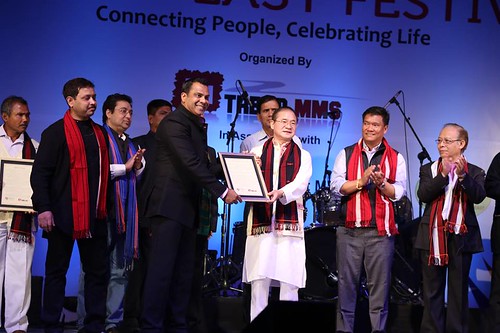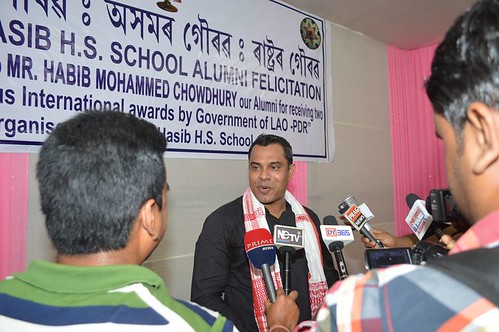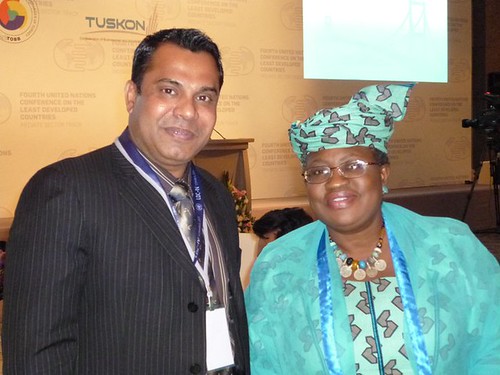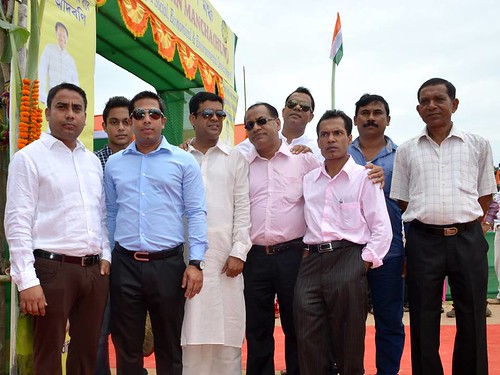ENTREPRENEUR HABIB CHOWDHURY SPREADING AROMA IN LAOS TO STRENGTHEN INDIA’S ‘LOOK EAST’ POLICY
Chowdhury is the founding chairman of HSMM Group that has become the largest Agarwood and Agar based Product’s Company in South East Asia from a humble background in Assam.
By Abdul Gani, TwoCircles.net,
Guwahati: Lao People’s Democratic Republic (LPDR) is a small yet beautiful country in Southeast Asia, bordered by Burma and China to the northwest, Vietnam to the east, Cambodia to the south, and Thailand to the west.
Northeast India has a special connection with this country through Habib Mohammed Chowdhury. Born and brought up in Assam’s Hojai district, Chowdhury is not just a successful businessman today in that country but has been playing a crucial role in implementing the ‘Look East Policy’ – now termed ‘Act East’ policy by PM Narendra Modi – between northeast India and South East Asia.
Chowdhury is the founding chairman of HSMM Group that has become the largest Agarwood and Agar based Product’s Company in South East Asia from a humble background in Assam.
In an exclusive interview with TwoCircles.net, Chowdhury shares his experience and future plans.
TCN: Tell us something of your childhood and young days in Hojai.
Habib Mohammed Chowdhury: Life was hard during my childhood days and I started my education in a humble Assamese medium school in Hojai. More than ever, I am very thankful to my teachers who patiently moulded me during those days.
With a small pharmacy and another small business, my father strived to give us the right education. With four sons and two daughters, my parents struggled to keep me and my siblings away from the streets and keep us in the school.
Since my earlier days, I was interested in trade and commerce under the guidance of my father.
Due to financial crisis in the family, I had to drop out from my college. Leaving everything in Hojai I had to go to Dubai to bear the responsibility of looking after my whole family.

Habib Chowdhury (Left) being felicitated by Arunachal Pradesh chief minister Nabam Tuki in an event in New Delhi.
There were moments when I had to be absent on some of the most important events in the family, including my sister’s wedding and the funeral for my grandmother. It was because I learnt to be practical. What I did was sending my travel money instead of coming home myself. I had to do it for the well being of the family.
TCN: How you started your company in Dubai in the early 1990s?
Habib: In the 1990s, Dubai was not yet on its prime as we are seeing now. But thankfully, with recommendations from some of my best friends, we went together, tried our luck in the aggressive realm of United Arab Emirates. We have seen the booming market for real estate in Dubai, grabbed that window of opportunity and slowly made our way there. Also, in keeping in the family tradition, I went into the trade of agarwood and agarwood oil.
In a competitive world of Dubai, the cutthroat business environment there, taught me a lot of things, which made me who I am today. While staying in Dubai, I kept looking at other countries where I can get to be a producer of agarwood and not just the trader.
So, after exhaustive research, I came across the rich land of Lao PDR. In this country, I saw not just its rich potentials but also the many more possibilities ahead of me.

Habib Chowdhury interacts with media during an event at his hometown in Hojai in Assam.
Habib: It is always difficult when we are starting something. And I had to start from the scratch, as they say, from the ground level up. First, there is the language barrier. I migrated to Lao PDR with almost no knowledge of their language. Also, there were not much of other foreign nationals entering the investment market in this foreign country.
But I used that as my advantage. As much as I needed to study the language, I also had to study the culture. For some, it is something to be feared, but I saw it as a challenge. As they say, opportunities are often disguised as impossibilities.
And I saw my real strength when I started in Lao PDR. I started to understand myself more. I love being an entrepreneur. “Dare to dream, Dare to try. No goal is too distant, no star is too high,” I reminded myself these lines over and over again when I was thinking to quit sometimes.
TCN: Why you decided to shift to Laos? How helpful has been its government?
Habib: I noticed that there were not many foreign investors entering Lao, I saw this as a challenge for me. Maybe others were just afraid to enter or they don’t want the risk involved. I saw this as an invitation to start with a clean slate. And during my research for agarwood, I came across the fact that Lao PDR was also gifted with agarwood trees. Maybe of a different species, but a good source of agardwood and oil just the same, so I grabbed the opportunity.
When the government saw my sincerity regarding my desire to discover Lao and its magical natural resources is not just to exploit it for my personal gain but to give what is best for everyone, especially the locals who will have the opportunity to be employed, they welcomed me and they became second family.
The government was so willing to help me set up the company. They have been assisting me all the way, from the start-up until now where we at HSMM Group is now entering into new ventures.
TCN: You have also played a role in implementing the ‘Look East’ policy with the South East Asian countries. Which are the things India should focus to see a success in this regard?
Habib: The Look East Policy which came into effect in 1992 and mainly concentrating on road connectivity to southeast Asian countries especially for enhancing and promoting bilateral trade/ economic means.
Northeast of India has a very important/strategic location. Nestled between Bangladesh, China, Bhutan, and Myanmar, it is ideally positioned for trans-border trade. Moreover, the neighbouring ASEAN region is one of the most dynamic economic regions of the world today. The ‘Look East Policy’ of our government offers a huge opportunity to transform the whole economic landscape of this region.

Habib Chowdhury (Left) with Ngozi Okonjo-Jweala, managing director of World Bank during the United Nations LDC meeting in Istanbul in 2011
Habib: I will always have my heart for my home state. My dream of becoming an avenue of change and improvement for my beloved home state will always be in my mind. I believe we need to tap business on agriculture as we are gifted with a very arable land to start with.
What I wanted my home state to have is the best education, so one of the projects I have started is building a modern school in Hojai. It shall be named Creative Model Higher Secondary School.
TCN: What is your view on the economic growth of NE India? Which are the obstacles that are making it slow?
Habib: Northeast India has been so blessed not just with vast natural resources including agriculture but good human resources as well. We just have to grab every opportunity that comes our way. We are slowly improving in the region, but it needs more developments.
In the past decade, there has been obvious change and advancement and we just need to continue the effort we are doing. The government and the business sector should be involved more in promoting peace and prosperity in the region. And I think the business sector should not shy away in promoting harmony and goodwill as with serenity comes more potential.
Also, every citizen has the social responsibility to promote even small-scale businesses and local products of the state and bring them to national and international market through better branding and marketing strategies while also protecting local crops.
Also, Northeast India should highlight on the eco-tourism potentials of the states. Showcasing natural wonders responsibly by exhibiting beautiful biological sights but taking care of them as well is a very good prospect.
TCN: Away from business, a different question for you. If we talk about the Muslims especially of Assam and rest of the country, they have always been backward. In your view, is this just due to the negligence of the government or something else?
 Habib Chowdhury (centre) with his friends and relatives at his hometown in Hojai in Assam
Habib Chowdhury (centre) with his friends and relatives at his hometown in Hojai in Assam
But to answer your question, I would say that the government did its share of promoting the welfare of the Muslims. The only thing needed to put the Muslims in the forefront is better education. Education should be one of our priorities for us to move forward. If my Muslim brothers and sisters will have the deep desire and will for education, then we will never be deemed backward.
The best way to move forward is for educating more both our men and women equally. I strongly suggest that we must educate our Muslim women. Once our women are more educated, then she is more empowered. And from that, she can automatically empower the lives and the minds of her kids and her entire family. While the men of the house are toiling to provide for the whole family, then the wife should train and instruct her family towards more Muslim advancement.
TCN: Tell our readers more about your family. What are the things you enjoy doing besides your work?
Ans: I am always a family man. I see to it that my whole family knows that and feels that they are my priority. I wanted them to see the value of the family, how important it is for a man to keep his family together. I wanted them to recognize how I valued my family more than any earthly gains. I make it my effort to let them understand where we come from, what are our roots are.
Wherever we are, whether at home or abroad, I make it sure that we bring with us the legacy that was passed on to me by my ancestors.
Mostly on weekends, I spend my time with them devoid of other concerns. I believe the most important thing I can spend for them is not money, but a quality time exchanging stories, laughter, my children’s dreams and aspirations.
Also, my wife loves to cook and she makes very wonderful dishes. I love to have dinner with them, over traditional meals prepared by my wife and trade stories and anecdotes with my two sons.
I make it sure that my family will understand the culture and tradition we have, not simply by practice but by heart. In this time and situation when we are not in India, I try as much as I can to bring my own culture within the home. More importantly, the values I have learned from my childhood I want to impart to them and hoping that it will make them a better and stronger individual than most of their contemporary, and that they will live with that same legacy.
Praises of other people don’t matter when your own family averse you. I believe that the success of a man is not measured by the money he has in the bank but the love he shared and experienced in his own household.
TCN: What is the plan for future?
Habib: As our catch-phrase in the HSMM Group, we are beyond expectation. I wanted to transcend what I expect from myself, I wanted to surpass what others expect from me.
We have big ventures ahead of us. Two very new important additions in HSMM Group are the HSMM Fragrances and HSMM Mining. These are my main concerns right now, and I am giving my best to make this not just another profit-oriented venture but an avenue of change for improvement and betterment for the HSMM Group and for Lao, PDR.
And I intend to not stop from here, together with my brother, Sadik who is with me here in Lao PDR; we will aim for better future undertaking that will reach beyond expectation.






